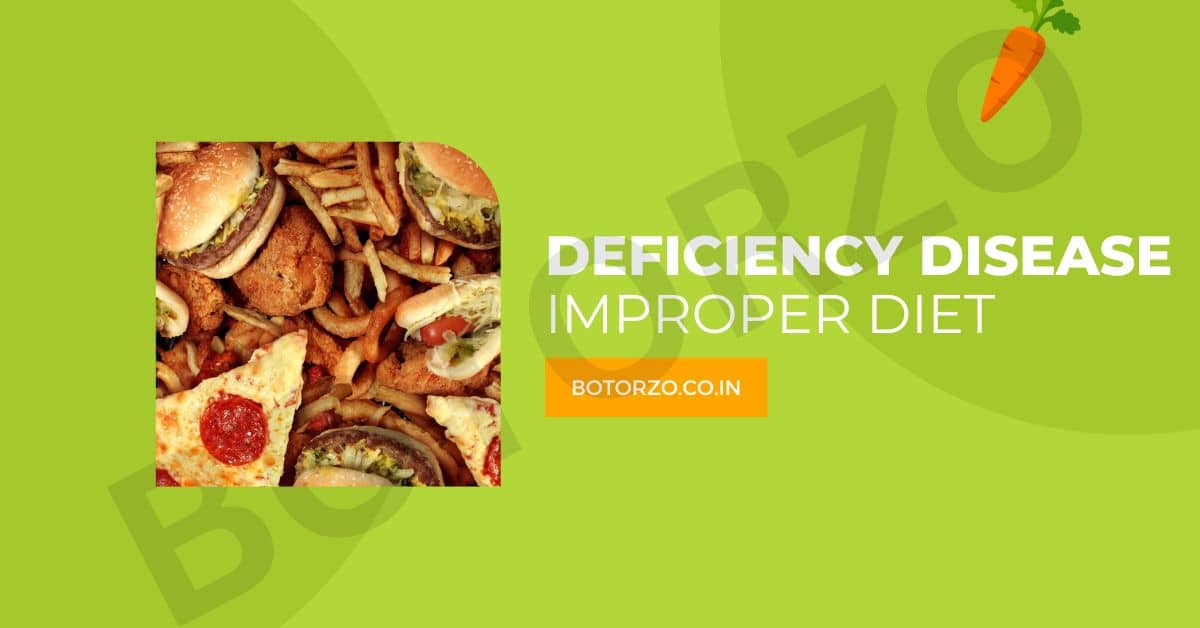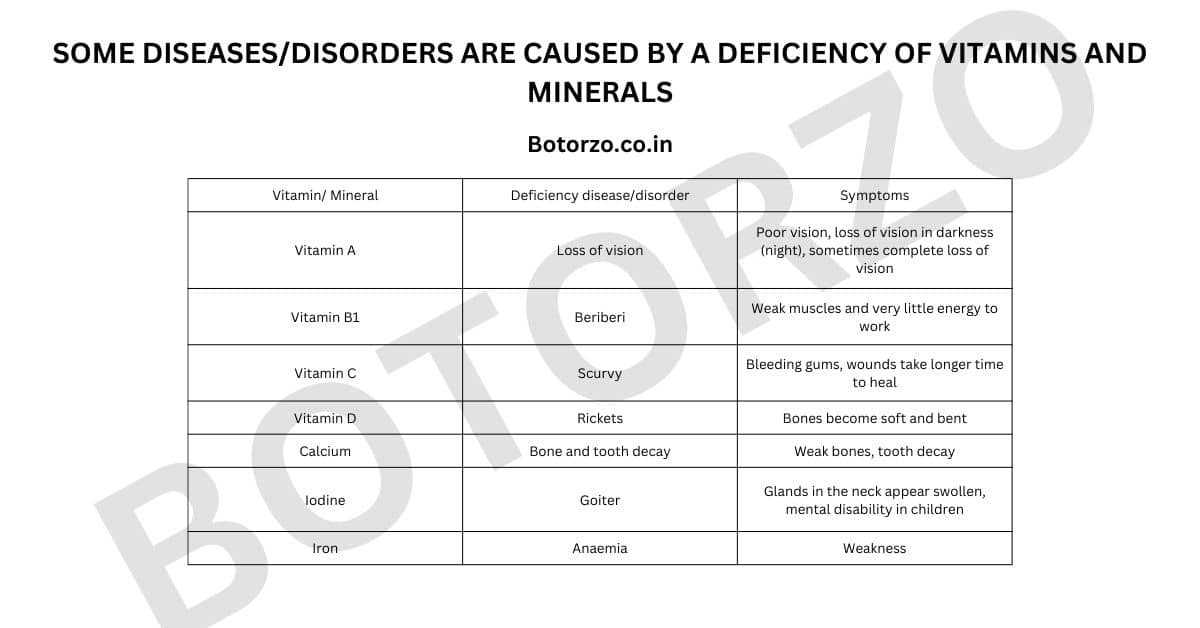
Even though a person is eating enough food, occasionally the meal may not include all of the nutrients that person needs. The person may experience a deficit or Deficiency Disease, if this persists for a long time.
In human bodies, deficiencies in one or more nutrients can lead to illnesses or problems.
Deficiency diseases are illnesses that develop over an extended period of time as a result of the nutritional shortage.
For an extended period of time, a person who does not consume enough proteins is more prone to have growth retardation, facial swelling, hair discolouration, skin problems, and diarrhoea.
What Is an Improper Diet?
A diet that does not give the body the nutrients it needs to function correctly is referred to as being inappropriate. This may be brought on by several factors, including eating too many or too few calories, getting too much of one nutrient while not getting enough of another, eating too much processed or junk food, or not eating a balanced diet.
Nutrient deficiencies, weight gain or obesity, digestive difficulties, and an increased risk of chronic illnesses including heart disease, diabetes, and some cancers are just a few of the health issues that can result from eating improperly. To maintain a healthy diet and guarantee maximum health, it’s crucial to eat a variety of nutrient-rich foods in the right amounts.
What Is Deficiency Disease?
Deficiency diseases are health conditions that result from a lack of essential nutrients in the diet. These nutrients include vitamins, minerals, and other essential compounds that are needed for the proper functioning of the body.
improper diet can cause Deficiency Diseases
Deficit illnesses might result from an improper diet. Deficiencies that can lead to a variety of health issues can occur when a person’s diet is deficient in some vital nutrients. As an example, a diet deficient in iron can cause iron deficiency anaemia, but a diet poor in vitamin C can cause scurvy.
Lack of vitamin D in the diet can cause osteomalacia in adults and rickets in youngsters. Similar to how a diet low in iodine can cause goitre, a diet poor in calcium can cause osteoporosis. To avoid deficiencies and preserve good health, it is crucial to eat a well-balanced diet that contains all the necessary elements in the right quantities.
For an extended length of time, a diet lacking in both carbs and proteins may cause the development to entirely halt. Such a person becomes incredibly weak, skinny, and may not even be able to move.
Note:
For an extended length of time, a diet lacking in both carbs and proteins may cause the development to entirely halt. Such a person becomes incredibly weak, skinny, and may not even be able to move.
Some diseases/disorders are caused by a deficiency of vitamins and minerals

| Vitamin/ Mineral | Deficiency disease/disorder | Symptoms |
|---|---|---|
| Vitamin A | Loss of vision | Bleeding gums and wounds take a longer time to heal |
| Vitamin B1 | Beriberi | Weak muscles and very little energy to work |
| Vitamin C | Scurvy | Glands in the neck appear swollen, and mental disability in children |
| Vitamin D | Rickets | Bones become soft and bent |
| Calcium | Bone and tooth decay | Weak bones, tooth decay |
| Iodine | Goiter | Glands in the neck appear swollen, and mental disabilities in children |
| Iron | Anaemia | Weakness |
Vitamins and minerals are essential nutrients that our bodies need to function properly. A deficiency in these nutrients can lead to a range of diseases and disorders.
For example, a deficiency in vitamin D can lead to rickets in children and osteomalacia in adults, both of which are conditions that affect bone health. A deficiency in vitamin C can lead to scurvy, which causes weakness, anaemia, and skin problems. Iron deficiency can lead to anaemia, which is a condition where the body doesn’t have enough red blood cells to carry oxygen to the tissues.
Frequently Asked Questions
What causes vitamin and mineral deficiencies?
Deficiencies can arise as a result of a number of circumstances, including a poor diet deficiency in specific nutrients, an inability to absorb nutrients adequately (as in the case of gastrointestinal diseases), certain drugs, and certain medical conditions.
What are the symptoms of vitamin and mineral deficiencies?
Depending on the nutritional deficiency, symptoms may include fatigue, weakness, anaemia, skin issues, bone pain, cognitive impairment, and others.
How can I prevent vitamin and mineral deficiencies?
The best method to avoid deficiencies is to consume a well-balanced diet rich in fruits, vegetables, whole grains, lean proteins, and healthy fats. Supplements may be prescribed if you are not getting enough nutrients from your diet.
Can vitamin and mineral deficiencies be treated?
Indeed, deficiencies are frequently remedied by boosting nutritional intake through food or supplementation. Further medical therapy may be required in some circumstances to address the underlying cause of the deficit.
Are there any risks associated with taking vitamin and mineral supplements?
Yes, taking too much of certain nutrients can be harmful. It’s important to follow recommended dosage guidelines and talk to a healthcare provider before starting any new supplements
Our Another Domains Vidyapedia.in And Uietmdu.in

Comments (3)
Hiroyisays:
April 2, 2023 at 10:22 amNice Content
Rohit Mishrasays:
April 2, 2023 at 10:23 amGreat Sir ji